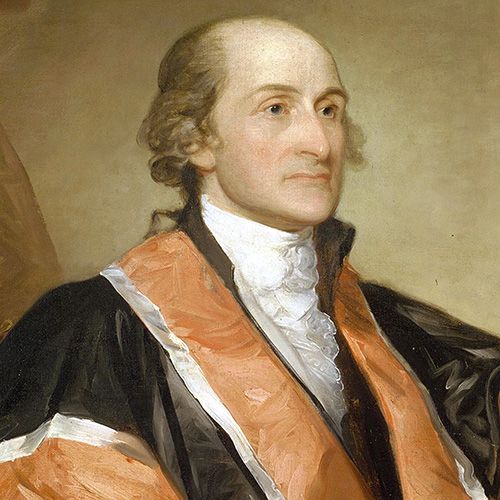You are viewing the article John Jay at Tnhelearning.edu.vn you can quickly access the necessary information in the table of contents of the article below.

(1745-1829)
Who Was John Jay?
John Jay was an American statesman and Founding Father who served in several government offices. Initially wary of the disruption that independence would bring, he soon devoted himself to the American Revolution. Jay served in the Continental Congress, was a diplomat, wrote some of The Federalist Papers and was the first chief justice of the U. S. Supreme Court.
Early Life
Born in New York City, on December 12, 1745, Jay spent his childhood in nearby Rye, New York. Jay came from a wealthy merchant family whose ancestors included French Huguenots. After graduating from King’s College in 1764, Jay began a career as a lawyer. He was already well-established in his career by the time that rifts with Great Britain and calls for independence erupted in the colonies.
During the Revolutionary War
Jay represented New York at the Continental Congress in 1774. His conservative nature initially had him searching for a way to maintain ties with Great Britain, something many other colonists also desired. However, wanting to ensure that colonists’ rights would be respected, Jay soon wholeheartedly supported the revolution.
In 1776, Jay went back to New York. After working as the state’s chief justice and helping to write the state constitution, he returned to the Continental Congress in 1778. Jay became president of the Congress, but would soon take on his most prominent role during the war—that of a diplomat.
As minister plenipotentiary, Jay traveled to Spain in an attempt to garner more support for American independence—a visit that was largely unsuccessful. Jay next joined Benjamin Franklin in Paris, France, where they negotiated an end to the Revolutionary War with the Treaty of Paris (1783).
A New Constitution and ‘The Federalist Papers’
With peace secured, Jay became the foreign affairs secretary under the Articles of Confederation. Frustration with the limited power of the state he represented led Jay to support a stronger central government, and a new Constitution.
Jay put pen to paper to show his support, joining Alexander Hamilton and James Madison to write five of the essays that became known as The Federalist Papers. The Federalist Papers discussed, and argued in favor of, the principles of government laid out in the Constitution. Jay also authored a pamphlet, “An Address to the People of New York,” which helped the Constitution attain ratification in New York.
Service to the United States
In 1789, George Washington appointed Jay as the Supreme Court’s first chief justice, a role he held until 1795. Jay took a break from judicial duties in 1794, when he went to Great Britain to address contentious issues such as exports, seizures and occupation. The resulting “Jay Treaty” sparked protests because it was considered too favorable for the British. However, the treaty averted a war that the United States was then ill-equipped to fight.
Upon his return to the United States, Jay learned that he had been elected governor of New York. He resigned his seat on the Supreme Court to take office. Jay refused a reappointment to the Supreme Court in 1800, citing his poor health and a reluctance to resume life on the judicial riding circuit.
Death and Legacy
In 1801, Jay stepped away from public life to retire to his farm in Bedford, New York. He died at his farm on May 17, 1829, at the age of 83. Having served his country for years as a judge, Constitutional advocate, diplomat and in elected office, Jay merits a place of honor among the Founding Fathers of the United States.
QUICK FACTS
- Name: John
- Birth Year: 1745
- Birth date: December 12, 1745
- Birth State: New York
- Birth City: New York
- Birth Country: United States
- Gender: Male
- Best Known For: One of the Founding Fathers of the United States, John Jay is known as one of the writers of ‘The Federalist Papers’ and for being the nation’s first chief justice of the Supreme Court.
- Industries
- U.S. Politics
- Astrological Sign: Sagittarius
- Schools
- King’s College (now Columbia University)
- Death Year: 1829
- Death date: May 17, 1829
- Death State: New York
- Death City: Bedford
- Death Country: United States
Fact Check
We strive for accuracy and fairness.If you see something that doesn’t look right,contact us!
CITATION INFORMATION
- Article Title: John Jay Biography
- Author: Biography.com Editors
- Website Name: The Biography.com website
- Url: https://www.biography.com/political-figures/john-jay
- Access Date:
- Publisher: A&E; Television Networks
- Last Updated: March 29, 2021
- Original Published Date: April 2, 2014
QUOTES
- The wise and the good never form the majority of any large society, and it seldom happens that their measures are uniformly adopted; or that they can always prevent being overborne themselves by the strong and almost never-ceasing union of the wicked and the weak.
- Too many in your State, as in this, love pure democracy dearly. They seem not to consider that pure democracy, like pure rum, easily produces intoxication, and with it a thousand mad pranks and fooleries.
Thank you for reading this post John Jay at Tnhelearning.edu.vn You can comment, see more related articles below and hope to help you with interesting information.
Related Search:



